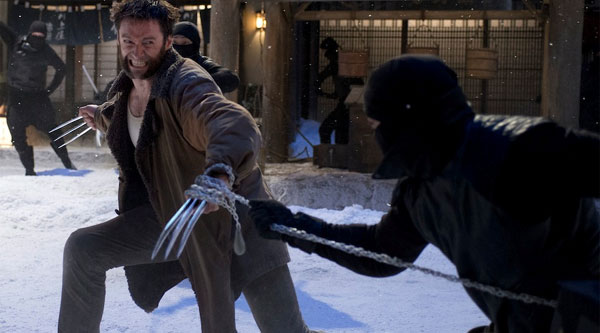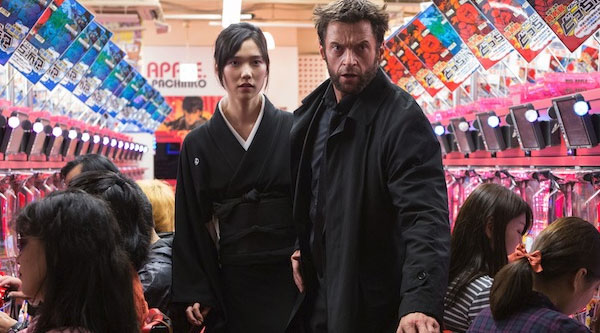It’s rather fitting that director James Mangold’s The Wolverine begins with its titular hero, played by Hugh Jackman, stuck at the bottom of a pit. After all, the last time that the character got his own solo adventure the results were rather disastrous. Not only was X-Men Origins: Wolverine a horror show for comics book fans, taking fan favorite characters like Deadpool and Gambit and stripping away everything we love about them, the movie was an ugly mess with a terrible narrative. It’s a stigma that has followed the new film all the way through production, but just like in the film it doesn’t take long for Wolverine to get out of his pit once the story gets going, and when he does the adventure he has is a pretty entertaining one.
Set after the events in Brett Ratner’s X-Men: The Last Stand, the new film finds Logan as a nomad living in a state of constant grief over his lost love Jean Grey (Famke Janssen). His situation changes, however, when he is found by a young Japanese woman named Yukio (Rila Fukushima), who has been searching for him for more than a year. She convinces him to return with her to Japan where her employer, a dying industrialist named Yashida (Hal Yamanouchi) makes the mutant hero an incredible offer. In return for saving Yashida’s life during the atomic bomb drop in Nagasaki during World War II, Wolverine is given the chance to be rid of his immortality and live a normal life. But while Logan initially turns down this offer, he quickly finds himself embroiled in a plot surrounding Yashida’s granddaughter, Mariko (Tao Okamoto), who has been targeted for assassination by the Yakuza.

The Wolverine successfully avoids some of the pitfalls that the worst of the X-Men movies fell into – particularly the urge to just load up the screen with as many different mutants as possible – and it definitely treads on some interesting ground thematically, but it never feels like the movie is fully capitalizing on its best ideas. Grief over the death of Jean is a perfect emotional starting point for Logan in the story, but the full weight of that emotion never really hits the audience. Likewise, the Japanese setting opens the doors to samurai culture, Wolverine’s life as a Ronin (a samurai without a master) and the concept of an honorable death for an immortal, long-suffering character, but by the end it all feels very surface level. You can appreciate what Mangold and writers Scott Frank and Mark Bomback tried to do with the story, but it just never feels fully realized.
While the story winds up being fairly straightforward and not everything works perfectly, credit should be given to the film just for trying something different than anything we’ve seen from the X-Men franchise. It doesn’t always work thematically, but Mangold successfully capitalizes on his setting aesthetically, as the director takes full advantage of the nation’s unique architecture, clothing, and even language to make the movie feel unique. It’s also surprisingly refreshing that Jackman is really the only recognizable star in the film, which both helps support the story’s focus and adds an extra fish out of water layer to the narrative.

Unlike the director of the last Wolverine movie, Mangold doesn’t ignore the fact that the central hero is a hot-tempered beast with knives that grow out of his hands, and makes the movie justifiably vicious and blood-pumping. The big chase and action sequences are fun – particularly a sequence set atop a 300mph bullet train – but Mangold’s camera and Jackman are at their best when the raging mutant is slicing and dicing Yakuza gangsters. It’s far from R-rated, but a quality portrayal of the character’s brutality in the comics. The movie may not fully deliver on many of its themes, but it does hit squarely on the man vs. beast battle that exists within Logan.
Reactionary fanboy culture has made it so that superhero movies are usually classified as either “the worst movie of all time” or “high art that should be on display at the Louvre,” but The Wolverine sits squarely in the middle. What it gets right gets somewhat undone by what it gets wrong, but at the same time its worst parts are elevated by its best. It’s a simple story adequately told, and it works just well enough.
This poll is no longer available.
For our To 3D or not to 3D guide to The Wolverine, go HERE.

Eric Eisenberg is the Assistant Managing Editor at CinemaBlend. After graduating Boston University and earning a bachelor’s degree in journalism, he took a part-time job as a staff writer for CinemaBlend, and after six months was offered the opportunity to move to Los Angeles and take on a newly created West Coast Editor position. Over a decade later, he's continuing to advance his interests and expertise. In addition to conducting filmmaker interviews and contributing to the news and feature content of the site, Eric also oversees the Movie Reviews section, writes the the weekend box office report (published Sundays), and is the site's resident Stephen King expert. He has two King-related columns.











